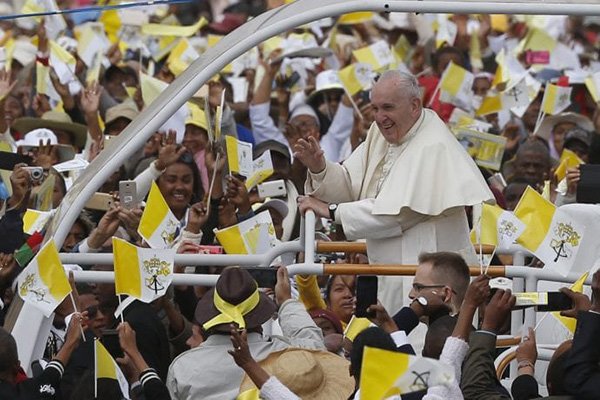
By Christopher White, National Correspondent
ENUGU, Nigeria — Two bishops who participated in a major summit on African Catholicism earlier this month have a message to the Catholic Church in the western world: Don’t bring your polarization onto our continent.
Bishop George Desmond Tambala of Zomba, Malawi believes the polarization in the Church in Europe and the United States “to be more political than doctrinal” – and a distraction from the real work of the Church.
“It would be very sad if this is transported to us in Africa. We deserve better,” Bishop Tambala told The Tablet during the Pan-African Congress on Theology, Society, and Pastoral Life, which took place December 5-8 in southeastern Nigeria.
Bishop Tambala said that partisan politics seems to be the interpretive key for which too many Catholics seek to understand church affairs.
“If you belong to this group, automatically you also take up this stand within the Church, which I find very sad,” he said.
Similarly, Archbishop Charles Palmer-Buckle of Cape Coast, Ghana said that divisions within the Church disappoint him, particularly when it comes to Pope Francis.
When Pope Benedict XVI resigned, Archbishop Palmer-Buckle said he, like much of the world, was shocked, but “we prayed to God for a worthy successor.”
Pope Francis, he says, “is the man God has given us and I’d like to believe my brother bishops look at him in the same light.”
Among the African bishops, both Archbishop Palmer-Buckle and Bishop Tambala believe the leadership of the continent is united behind Francis – and both are put off by efforts in the western world to undermine Pope Francis and openly challenge him.
“In Africa, we are brought up never to criticize our elders in public,” said Archbishop Palmer-Buckle, adding that if he had a disagreement or a concern with his father, he would address it “behind closed doors.”
“This is what I could pray for American bishops, for German and other European bishops,” he told The Tablet.
“When they step out in the public and create disaffection for the pope, they should not forget they are taking the carpet from underneath their own feet,” adding that bishops are undermining their own authority among the laity when they challenge the pope.
Bishop Tambala said he is puzzled when he hears claims that Francis is creating confusion in the Church.
“We don’t find it controversial at all,” he said of the African hierarchy. “It’s very hard for me to hear that people have difficulty understanding.”
“Going to the frontiers, taking care of the marginalized, having the smell of the sheep – this has been our life since time immemorial,” he added.
Archbishop Palmer-Buckle emphasized that Pope Francis is also building on the tradition of Popes John Paul II and Benedict XVI, particularly when it comes to focusing on the contributions that the African Church can offer to the global Church.
Reflecting back on the first Synod on Africa, initiated by Saint Pope John Paul II 25 years ago, Archbishop Palmer-Buckle said that the late pope and now saint “accepted inculturation as the type of evangelization that must be taken seriously in Africa.”
He also understood that evangelization “must impact the social, political, and economic dimensions of church life,” said the Ghanaian bishop, adding that Benedict XVI embraced all of that and added the dimension of reconciliation when he convened his own Synod on Africa ten years ago in order to help heal divisions within the continent.
Francis is “topping up what John Paul II started and what Benedict continued,” said Archbishop Palmer-Buckle.
As exhibit “A” of that, he points to the role that Cardinal Peter Turkson of Ghana has played in Rome.
Pope Emeritus Benedict XVI first tapped Cardinal Turkson in 2009 to head the Vatican’s then office on justice and peace – a role that evolved and took on greater significance under Pope Francis becoming the super-dicastery for the Promotion of Integral Human Development.
“We in Africa should look at [Turkson’s role] as a confirmation that we have something to contribute seriously,” said Archbishop Palmer-Buckle.
Further, he believes the pontiff’s emphasis on ecology is one that has particular resonance for the African continent.
Referencing the recent Synod on the Amazon, Archbishop Palmer-Buckle said “the Amazon in synonymous to the forest in the Congo.”
“The bishops in Africa are synergizing with the bishops of Brazil and Latin America about how the ecological lungs of the world can be saved,” he said – adding that Francis has offered a model for how bishops can engage politicians in a constructive manner.
Archbishop Palmer-Buckle noted that for Pope Francis, the goal is not to focus on the negative, but rather on “what we can do together.”
“He has encouraged us to get involved in the political nitty gritty of our country” and “to encourage what is positive,” he said.
For those that are trying to understand Pope Francis, both Bishop Tambala and Archbishop Palmer-Buckle have a shared piece of advice: Take the pope on his own terms and read firsthand what he says.
“I’ve made it a point to read everything he says and writes,” said Archbishop Palmer-Buckle. “He overwhelms me with his new perspectives of the same gospel.
“In no way can anyone tell me he has said anything in contradiction to Benedict or John Paul II,” he concluded. “He says the same thing in a more accessible manner.”
